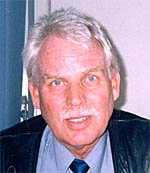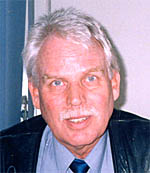
UCHP facelifts Yemeni historical cities [Archives:2002/34/Interview]
August 19 2002

Q: What are the objectives of the UCHP?
A: It is a program which was established as a collaboration between the government of Yemen and the Netherlands. The objectives of the program is to assist the government of Yemen in streamlining the urban cultural heritage sector. To this end , a program was devised between the government of Yemen and the Netherlands. In that program there were a number of main elements that should be dealt with . First is to assist the government of Yemen in developing a policy for urban cultural heritage; what to do with the historical cities of Yemen?. The second element is we should assist Yemen in developing a planning framework which actually would give the tools to implement the policy which will offer tools for protecting the historical cities and at the same time also would be giving a space for development. Urban cultural heritage does not mean that the historical cities should remain as they are, the cities should develop because undeveloped cities are a dead cities. We should have a living cities and that means development should take place within limitations and with respect of the historical environment. And thats actually in the planning frame work which is required to give the authority to Yemen ,possibility to monitor the development in the historical cities. The third element is relating to the institutional development. We see in the sector a number of authorities and organizations that are working from the government side and we find that the capacities within these organizations is insufficient to be able to monitor the cities well so, in the agreement with the government it was made clear that first we should look at who is doing what in the sector as well as assisting these organizations in building their capacity, meaning that we have to analyze how they are working at the moment and what kind of reform is required taking into consideration the decent progress that is on going in the country. The forth element is actually relates to awareness and community development. This the area where we would like the Yemen Times to cooperate with us because of the important role of the media to see in what way we can influence the public opinion to make them aware of what actually is the acid of the cultural heritage and what are the acids of the historical cities . We should not say only they are available, but also how can they be made of use for future development of the country; how can they contribute to the economic development of the country and alleviation of poverty. Part of this awareness is also the establishment of an information and documentation center because at the moment much information has been already gathered for UCHP but it gathered here and there and on body knows exactly how many historical cities in Yemen. We are assisting the ministry of culture in establishing a National register for historical cities which would help in designing a criteria that should be made by a city to be nominated in the list of the historical cities in Yemen. Therefore we can determine how many cities we are talking about and how many monuments in this country.
Q: What have you achieved so far and how do assess that?
A: Well, in fact the process started only in January of this year because till the beginning of Sep. 2001, we were actually in the process of establishing the program. Of course we have started many activities in Zabid for example. Zabid is one of the targeted historical cities, also in the request of the ministry of culture which it has received information from UNESCO that Zabid is in the list of historical cities in danger so we needed to do some actions in the ground. We started with the ministry of public works and urban development and ministry of culture to set up an urban plan for the city of Zabid. We also started providing funds for the local authorities there to start building a brick. This was a loan which is to be repaid so what we did is that we established an emergency funding which is specially for the private houses owners to do repairs in their houses. We started in Zabid as a test, repairing some thing like 50 houses and if the idea works well, we will ask donors for more funds for the idea to duplicated in some where else. What we have done in Zabid is that, we set up what can we call it An Urban Redevelopment Preservation Committee which actually is a committee assisting the local director which will guide the developments in Zabid. As we know the historical cities has a specific problems which do not related to the rest of the city so this is why we wanted a small body like the above mentioned committee as to be in charge of the historical cities only and decisions will be made through this committee.
Q: What are the difficulties that hinder your progress?
A: There is no much problems, but the main problem is that the people are not aware of their cultural heritage and did not recognize the danger that surrounds the historical cities and how could they do the improvements in the right way.
Q: The program is planning a two-month awareness program, could you tell us more about it?
A: Well, the campaign will start on September 1st running till the end of Oct., and the opening ceremony well be in the cultural center in Sanaa. It is mainly related to public awareness activities. The objective of the campaign is to educate people, people do not regard the built heritage of Yemen a part of cultural heritage. We also want to make the people aware of the beauty and the value of their cultural heritage and that it can be used as an economic acid. For this purpose we have a national campaign and a local campaign, national campaign starts here in Sanaa and during it there will be paintings, activities for children, photo exhibitions related to Urban Cultural Heritage trying to make the people more involved in what UCHP means for them. The local campaign will be launched in Zabid in the second half of September.
Q: What extend of cooperation do you expect from the media and authorities in this campaign?
A: From news papers, like the Yemen Times, we expect that they well assist us in reading this massage to the people, means that we need articles that are related to the urban cultural heritage, what it is value, how can it be used, and what kind of activities are taking place etc\. The same is required from the other media means like TV and radio, we hope that by the collaboration between the different media means we will have a certain type of coverage that the massage really will across. We expect also from the authorities to see that how they can contribute especially in the follow up of the campaign. People will need a concrete answers to their inquires on how to improve their historical houses, they need the governments support and assistant by all means
Q: Any further remarks you would like to make?
A: Im happy with collaboration that we have had till now, I see from every side that people are having an interest, trying to do their best and I hope that will continue in this way. We still have a long way to go because the urban cultural heritage in not high in the agenda of the government. The economic development is the highest priority of the government, we agree on that and try to integrate cultural heritage into it. Together with media we can fulfill this task of integrating cultural heritage into the economic development and this is of the most important goals to be achieved.
——
[archive-e:34-v:2002-y:2002-d:2002-08-19-p:./2002/iss34/intrview.htm]


